In order to fulfill KNCCI’s mission which is ;To facilitate and promote a sustainable business environment for economic growth and prosperity. The Chamber Leadership led by the Chamber President Mr. Richard Ngatia and Chamber 1st Vice President Dr. Erick Rutto accompanied by board members and the management had the 1st session with the departmental committee of trade industry and cooperative led by the committee chairperson Member of Parliament, Embakasi North Hon. Gakuya, James Mwangi.
The Chamber President Mr. Richard Ngatia took the members of the committee present through KNCCI’s structure and mandate to support its members across all the 47 counties. KNCCI operates through four pillars;
- Trade facilitation
- SME Development
- Advocacy
The Chamber president presented to the committee the proposed areas of intervention for improved ease of doing business, MSMEs growth and sustainability enhancement through policy and regulatory intervention.
He stated the current issues affecting the business community and proposed areas of intervention which include;
- Automation of public procurement
There is need for automation of public procurement and move into paperless public procurement to eliminate logistics and huge printing costs at both counties and National level. Expression of interest, submission of proposals and tender bids if automated will enable SMEs to submit their bids at low cost.
- Digital Registration of farmers
There is need to support legislation through mass digital registration of farmers and businesses at the county level to create effective value chain linkages thus creating sustainable market opportunities. This will also make it possible to create joint/common user facilities and formation of new cooperatives.
- Removal of prequalification charges
There is need for legislation on the removal of prequalification charges in both private and public sector to make it possible for SMEs, youth and start ups to be able to participate in tenders.
- Deduction of pending VAT refunds on income tax
Relooking at the current VAT system, we note that it is punitive for businesses as it does not allow claiming of input VAT for SMEs if VAT is deducted at source, especially for those doing business with the government. This has made VAT a cost doing business rather than a revenue collection mechanism.
The Chamber 1st Vice President Dr. Erick Rutto highlighted that KNCCI in collaboration with the ministry of Health worked towards the production of reusable masks during the covid period with 4 major companies which exposed a challenge in the cotton industry there being a shortage in raw materials.
He urged for the government’s commitment to support the cotton industry through;
- Enactment of the cotton industry development bill 2021
Act of parliament to provide for the production, processing, marketing and distribution of cotton in Kenya and its products, establish the cotton industry development board; provide a framework for cotton farming, ensure value addition to cotton and its related products and for connected purposes.
- Value Chain
Enhance productivity and total production through better seeds, irrigation, CSA management practices for key value chains. Develop targeted incentives to encourage stronger engagement of producers by downstream actors.
- Standards
Existing cotton standards and classification should be redesigned to align with Kenya’s climate smart agriculture strategy, in coordination with relevant institutions across the sector. Farmer cooperatives and private ginneries should receive public support to promote and end high quality production through input access and CSA extension training.
- Aggregation
Downstream actors, including ginneries, yarn spinners and textile manufacturers, should be registered through digital platforms to facilitate downstream integration. This will incentivize businesses to invest backward in their supply chain by investing in training and service provision for farmers partnerships between farmer cooperatives to enhance market linkages.
Dr. Rutto urged the government to come up with a Kenyan Export Bank that can offer financial solutions to SMEs that lack financial capacity to conduct exports of their products. He also emphasized that it would be ideal for the government to allocate Quality assurance officers in various countries of export so as to guarantee exporters of quality of goods.
KNCCI Trans- Nzoia County Chairperson Mr. Martin Waliaula in his remarks urged the government to look into the issue of multiple levies, multiple levies by counties are hurting traders. The government is yet to make a policy that guides taxation and licensing by counties and the national government. Multiple taxation and licensing by the two levels of government has been blamed for making it difficult to do business in Kenya.
KNCCI Economic Diplomacy committee chairperson Mr. Ronald Meru stated that automation of the procurement system will enable suppliers to the government get allocated a credit score, It will also act as a form of creating data of the SMEs and their supply capability making it easier to transact business.
KNCCI Chairman Resource Mobilization committee Mr. Stephen Mbugua urged the parliamentary committee to pursue lower power tariffs which is a major cost of doing business for industries. Lower power tariffs will enable businesses make better profit margins. He urged the committee to give longer repayment period terms for manufacturers for up to 20 years unlike the current 7 years.
Mr. Mbugua termed unfair competition from investors as a hinderance to business growth especially on local products and urged the government to promote “Buy Kenya Build Kenya” which can only be achieved by only importing products that cannot be locally produced.
He concluded my urging the government to curb multiple licensing, Businesses require several approvals to operate, in an already tough environment.
KNCCI Ag. Chief Executive Officer Mr. Patrick Nyangweso urged the government to partner with KNCCI to conduct research to have a regular performance index as a trade enabler. There is need to have Industrial Development centers as common user facilities to avoid post-harvest losses.
There is need to have legislation at the sub-county levels to curb sub anti counterfeit goods. The SMEs credit guarantee scheme encourages banks to disburse credit to borrowers across all the 47 counties. The fund was established to enhance access to quality and affordable credit for the growth and operations of MSMEs which would otherwise find it difficult to access loans from commercial banks.
KNCCI Company Secretary Mr. Kihara Njuguna urged the committee to assist KNCCI fraternity to reclaim its premises located at Ufanisi house through healthy negotiations and working together closely for the business community. He urged the two entities to work on a policy framework that will see to it that the government supports KNCCI trade missions and make KNCCI an anchor within the government.
KNCCI Trade Research and Policy Manager Ms. Caroline Kosiom concluded by urging the government to work closely with World Trade Organization (WTO), East Africa Community (EAC) and The African Continental Free Trade Area to boost trade within the country and beyond to attract investment, boost trade, provide better jobs, reduce poverty, and increase shared prosperity.
Member of parliament for Aldai Constituency in Nandi County, Hon Marianne J. Kitany who is also the vice chairperson of the committee of trade, Industry and Cooperatives appreciated KNCCI’s role in advocating for a conducive business environment. She urged KNCCI to work closely with both the county and national government to have a common unit for the standardization and taxation which are the major issues affecting business.
Member of Parliament, Embakasi North Hon. Gakuya, James Mwangi. Who is also the committee chairperson concluded by giving the KNCCI leadership assurance that the committee will work closely to discharge their constitutional mandate of representation, legislation and oversight.

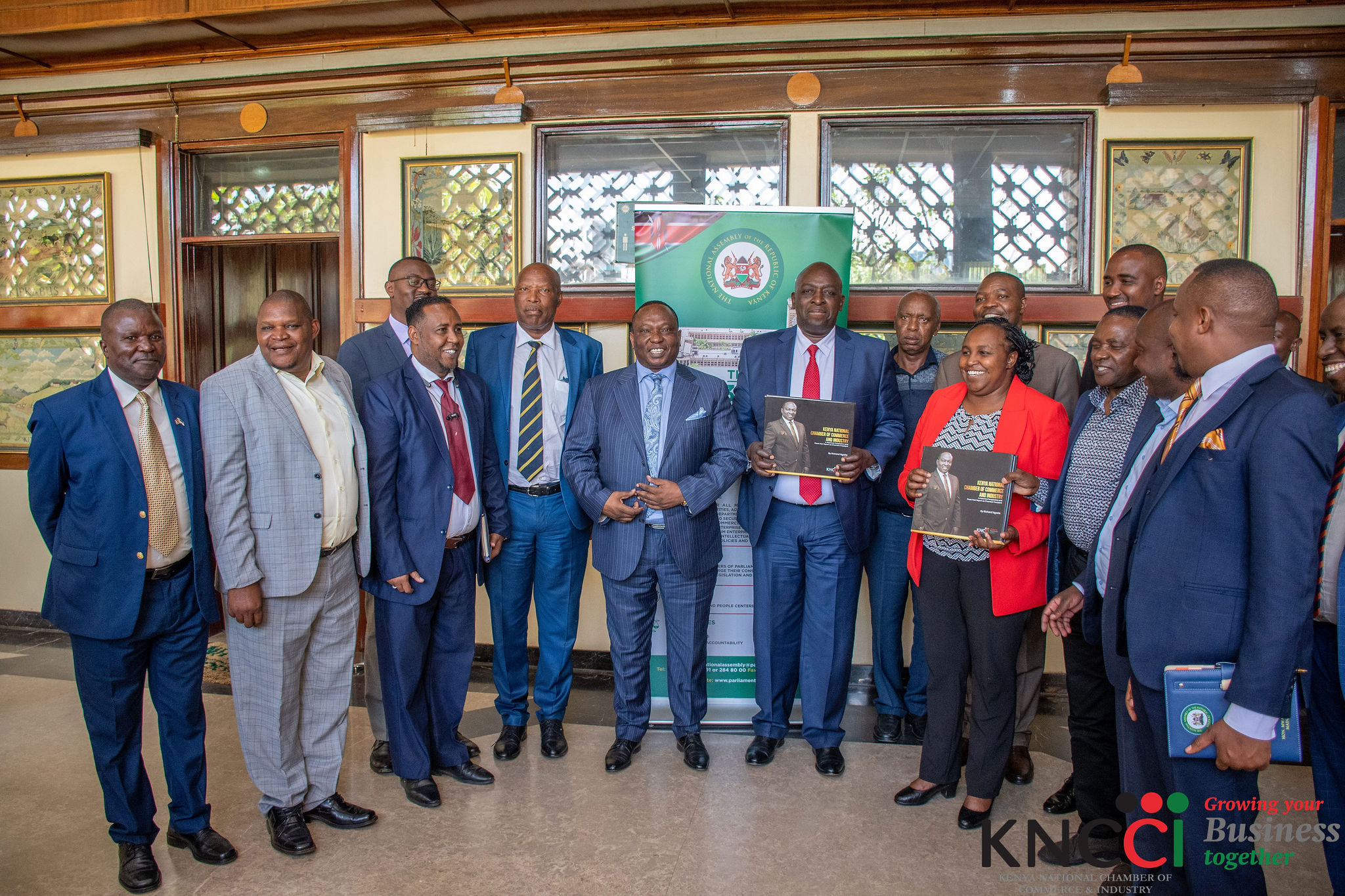
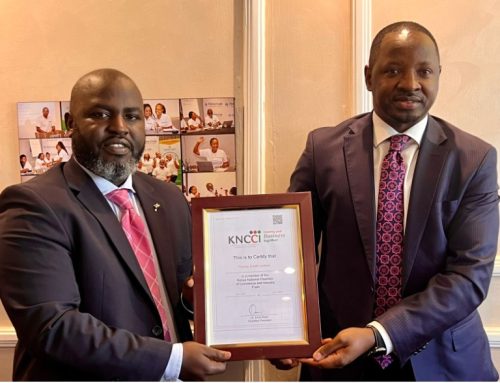
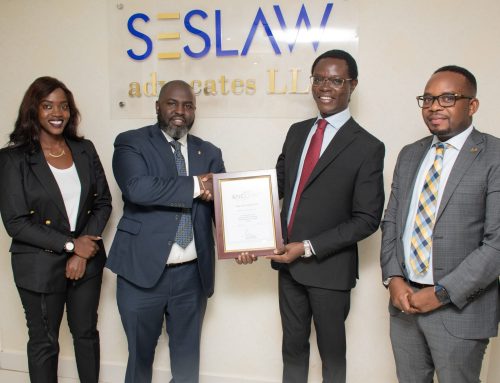
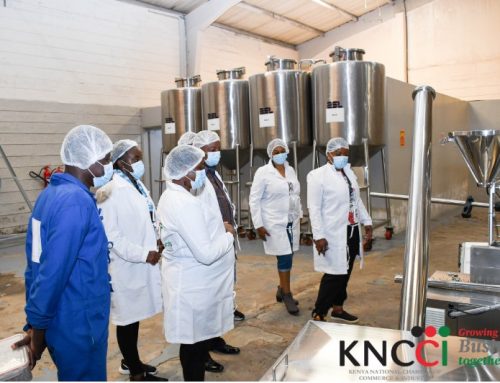
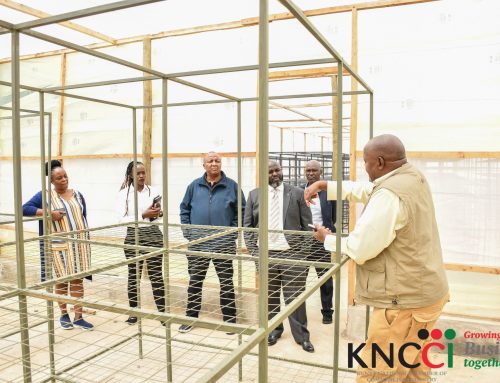
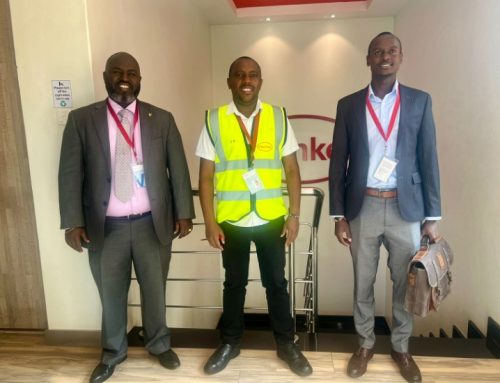
Leave A Comment